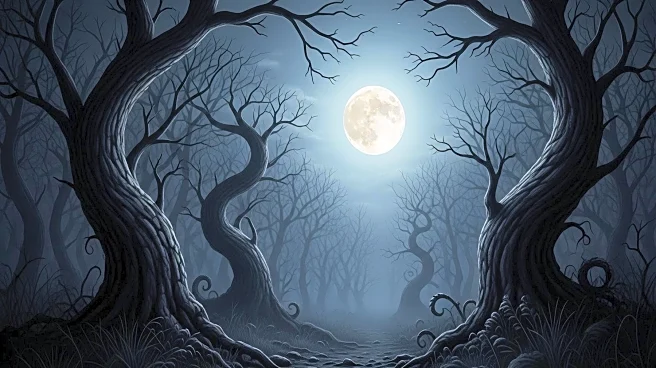What's Happening?
T. Kingfisher, a noted author, has released her fourth horror novel set in North Carolina, titled 'Wolf Worm.' Kingfisher's work often draws inspiration from the landscapes she has lived in, with her North Carolina novels reflecting the unique and sometimes unsettling environment of the region. Her previous novel, 'The Twisted Ones,' was similarly inspired by the dense, impenetrable forests of North Carolina, contrasting with the tall trees and ferns she was accustomed to on the West Coast. Kingfisher's fascination with landscapes extends to her novel 'Snake-Eater,' set in the American Southwest, a region she grew up in and considers formative. The desert setting of 'Snake-Eater' is described as alien and hostile, featuring gods and spirits, with desert creatures like javelinas playing significant roles. Kingfisher's work often incorporates elements of nostalgia and personal experiences, blending them with horror themes.
Why It's Important?
Kingfisher's exploration of landscapes in her horror novels highlights the importance of setting in storytelling, particularly in the horror genre. By using real-world environments as a backdrop, her novels offer readers a unique perspective on how geography can influence narrative and character development. This approach not only enriches the storytelling but also provides a fresh take on horror, moving away from traditional settings to more unconventional ones. The use of landscapes as a character in itself can deepen the reader's engagement and understanding of the story, offering a more immersive experience. Kingfisher's work also underscores the cultural and ecological diversity of the United States, showcasing how different regions can inspire varied narratives and themes.
What's Next?
Kingfisher's continued exploration of diverse landscapes in her novels may inspire other authors to consider unconventional settings for their stories, potentially leading to a broader range of narratives within the horror genre. As readers become more interested in unique and authentic settings, publishers might seek out works that offer fresh perspectives on familiar genres. Kingfisher's novels could also spark discussions on the role of environment in shaping human experiences and narratives, encouraging readers to reflect on their own surroundings and how they influence their perceptions and stories.
Beyond the Headlines
Kingfisher's novels delve into deeper themes of identity and belonging, as characters navigate landscapes that are both familiar and alien. This exploration can resonate with readers who have experienced similar feelings of displacement or nostalgia, offering a cathartic experience through the horror genre. Additionally, her work raises questions about the relationship between humans and nature, and how cultural perceptions of landscapes can shape narratives and beliefs. By incorporating elements of mythology and spirituality, Kingfisher's novels invite readers to consider the complex interplay between environment, culture, and identity.









